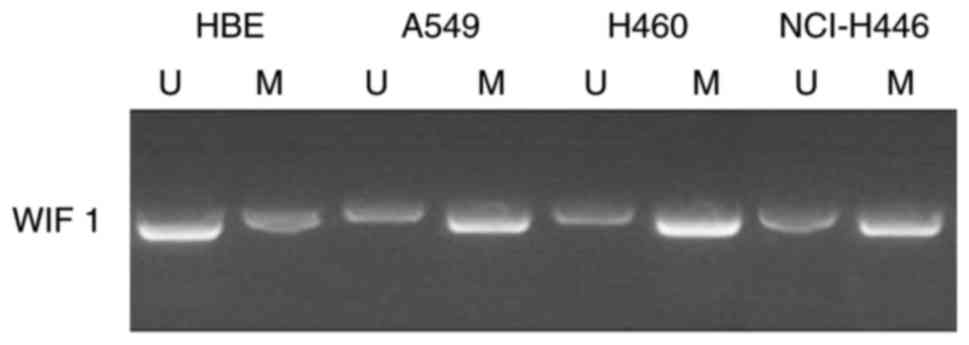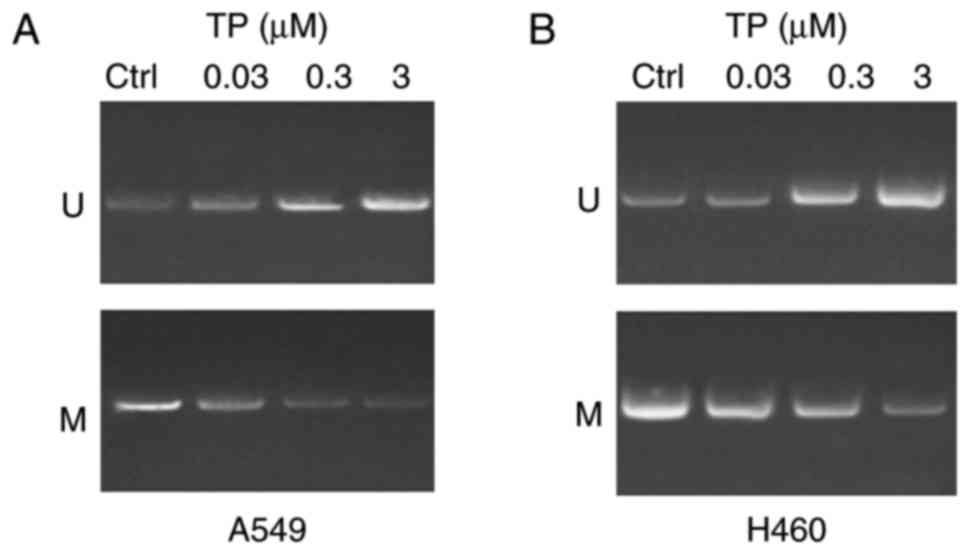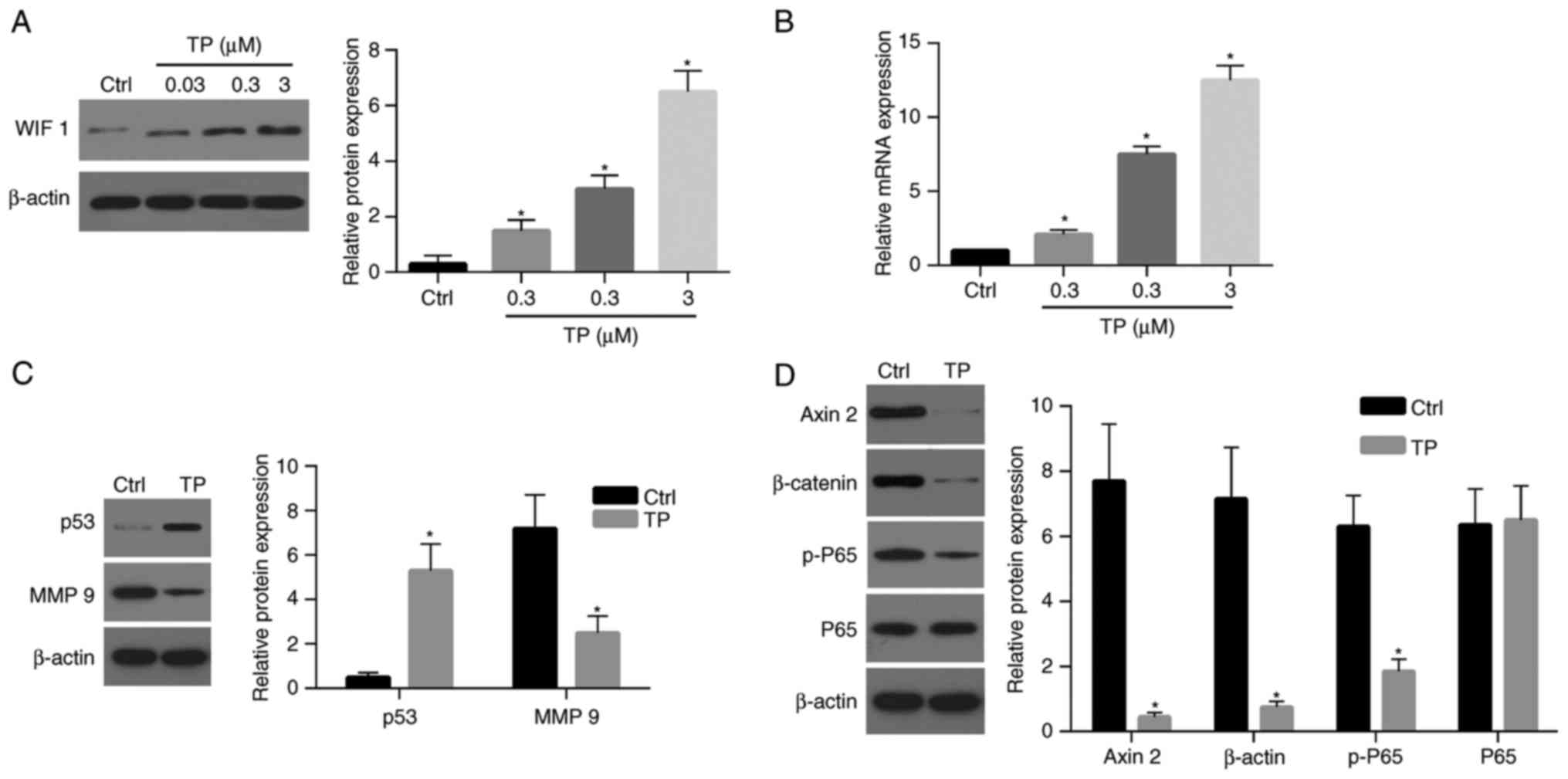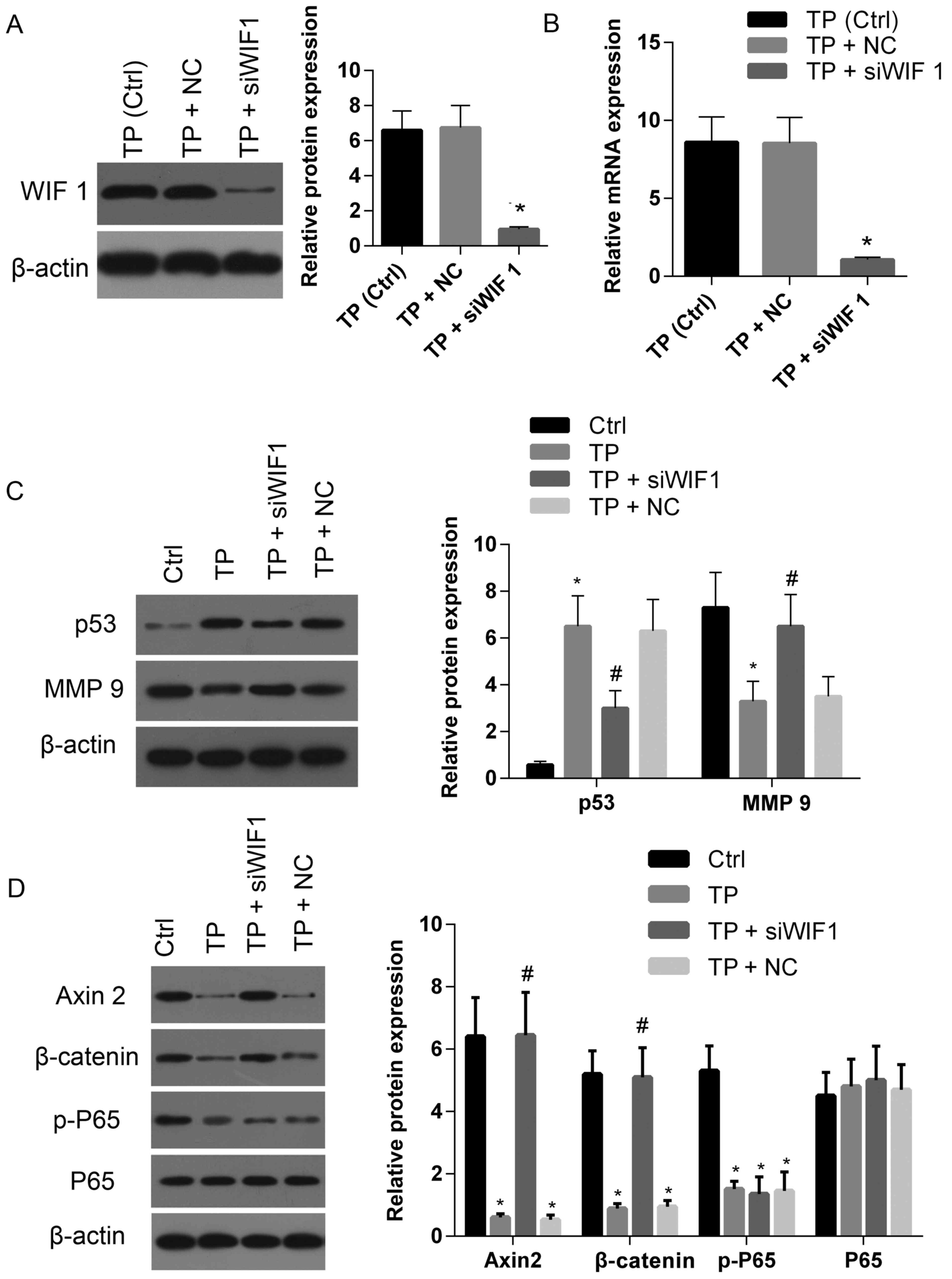|
1
|
Zhao F, Chen Y, Li R, Liu Y, Wen L and
Zhang C: Triptolide alters histone H3K9 and H3K27 methylation state
and induces G0/G1 arrest and caspase-dependent apoptosis in
multiple myeloma in vitro. Toxicology. 267:70–79. 2010. View Article : Google Scholar : PubMed/NCBI
|
|
2
|
Borja-Cacho D, Yokoyama Y, Chugh RK,
Mujumdar NR, Dudeja V, Clawson KA, Dawra RK, Saluja AK and Vickers
SM: TRAIL and triptolide: An effective combination that induces
apoptosis in pancreatic cancer cells. J Gastrointest Surg.
14:252–260. 2010. View Article : Google Scholar : PubMed/NCBI
|
|
3
|
Wang W, Li X, Sun W, Zhang L, Zhang M,
Hong B and Lv G: Triptolide triggers the apoptosis of pancreatic
cancer cells via the downregulation of Decoy receptor 3 expression.
J Cancer Res Clin Oncol. 138:1597–1605. 2012. View Article : Google Scholar : PubMed/NCBI
|
|
4
|
Pan J: RNA polymerase-an important
molecular target of triptolide in cancer cells. Cancer Lett.
292:149–152. 2010. View Article : Google Scholar : PubMed/NCBI
|
|
5
|
Wu Y, Cui J, Bao X, Chan S, Young DO, Liu
D and Shen P: Triptolide attenuates oxidative stress, NF-kappaB
activation and multiple cytokine gene expression in murine
peritoneal macrophage. Int J Mol Med. 17:141–150. 2006.PubMed/NCBI
|
|
6
|
Jiang XH, Wong BC, Lin MC, Zhu GH, Kung
HF, Jiang SH, Yang D and Lam SK: Functional p53 is required for
triptolide-induced apoptosis and AP-1 and nuclear factor-kappaB
activation in gastric cancer cells. Oncogene. 20:8009–8018. 2001.
View Article : Google Scholar : PubMed/NCBI
|
|
7
|
Mackenzie TN, Mujumdar N, Banerjee S,
Sangwan V, Sarver A, Vickers S, Subramanian S and Saluja AK:
Triptolide induces the expression of miR-142-3p: A negative
regulator of heat shock protein 70 and pancreatic cancer cell
proliferation. Mol Cancer Ther. 12:1266–1275. 2013. View Article : Google Scholar : PubMed/NCBI
|
|
8
|
Gil L and Adonis M: Genomics and
proteomics offers new hopes towards a personalized approach to lung
cancer prevention and treatment. Elec J Biotechnol. 6:401–409.
2003. View Article : Google Scholar
|
|
9
|
Lemos C, Kathmann I, Giovannetti E, Calhau
C, Jansen G and Peters GJ: Impact of cellular folate status and
epidermal growth factor receptor expression on BCRP/ABCG2-mediated
resistance to gefitinib and erlotinib. Br J Cancer. 100:1120–1127.
2009. View Article : Google Scholar : PubMed/NCBI
|
|
10
|
Sun JM, Won YW, Kim ST, Kim JH, Choi YL,
Lee J, Park YH, Ahn JS, Park K and Ahn MJ: The different efficacy
of gefitinib or erlotinib according to epidermal growth factor
receptor exon 19 and exon 21 mutations in Korean non-small cell
lung cancer patients. J Cancer Res Clin Oncol. 137:687–694. 2011.
View Article : Google Scholar : PubMed/NCBI
|
|
11
|
Rho JK, Choi YJ, Jeon BS, Choi SJ, Cheon
GJ, Woo SK, Kim HR, Kim CH, Choi CM and Lee JC: Combined treatment
with silibinin and epidermal growth factor receptor tyrosine kinase
inhibitors overcomes drug resistance caused by T790M mutation. Mol
Cancer Ther. 9:3233–3243. 2010. View Article : Google Scholar : PubMed/NCBI
|
|
12
|
Reya T and Clevers H: Wnt signalling in
stem cells and cancer. Nature. 434:843–850. 2005. View Article : Google Scholar : PubMed/NCBI
|
|
13
|
Yamulla RJ, Kane EG, Moody AE, Politi KA,
Lock NE, Foley AV and Roberts DM: Testing models of the APC tumor
suppressor/β-catenin interaction reshapes our view of the
destruction complex in Wnt signaling. Genetics. 197:1285–1302.
2014. View Article : Google Scholar : PubMed/NCBI
|
|
14
|
Logan CY and Nusse R: The Wnt signaling
pathway in development and disease. Annu Rev Cell Dev Biol.
20:781–810. 2004. View Article : Google Scholar : PubMed/NCBI
|
|
15
|
Sun J and Jin T: Both Wnt and mTOR
signaling pathways are involved in insulin-stimulated
proto-oncogene expression in intestinal cells. Cell Signal.
20:219–229. 2008. View Article : Google Scholar : PubMed/NCBI
|
|
16
|
Huang C, Ma R, Xu Y, Li N, Li Z, Yue J, Li
H, Guo Y and Qi D: Wnt2 promotes non-small cell lung cancer
progression by activating WNT/β-catenin pathway. Am J Cancer Res.
5:1032–1046. 2015.PubMed/NCBI
|
|
17
|
Benhaj K, Akcali KC and Ozturk M:
Redundant expression of canonical Wnt ligands in human breast
cancer cell lines. Oncol Rep. 15:701–707. 2006.PubMed/NCBI
|
|
18
|
Akiri G, Cherian MM, Vijayakumar S, Liu G,
Bafico A and Aaronson SA: Wnt pathway aberrations including
autocrine Wnt activation occur at high frequency in human
non-small-cell lung carcinoma. Oncogene. 28:2163–2172. 2009.
View Article : Google Scholar : PubMed/NCBI
|
|
19
|
Uematsu K, He B, You L, Xu Z, McCormick F
and Jablons DM: Activation of the Wnt pathway in non small cell
lung cancer: Evidence of dishevelled overexpression. Oncogene.
22:7218–7221. 2003. View Article : Google Scholar : PubMed/NCBI
|
|
20
|
Kim J, You L, Xu Z, Kuchenbecker K, Raz D,
He B and Jablons D: Wnt inhibitory factor inhibits lung cancer cell
growth. J Thorac Cardiovasc Surg. 133:733–737. 2007. View Article : Google Scholar : PubMed/NCBI
|
|
21
|
Ai L, Tao Q, Zhong S, Fields CR, Kim WJ,
Lee MW, Cui Y, Brown KD and Robertson KD: Inactivation of Wnt
inhibitory factor-1 (WIF1) expression by epigenetic silencing is a
common event in breast cancer. Carcinogenesis. 27:1341–1348. 2006.
View Article : Google Scholar : PubMed/NCBI
|
|
22
|
Gao Z, Xu Z, Hung MS, Lin YC, Wang T, Gong
M, Zhi X, Jablons DM and You L: Procaine and procainamide inhibit
the Wnt canonical pathway by promoter demethylation of WIF-1 in
lung cancer cells. Oncol Rep. 22:1479–1484. 2009.PubMed/NCBI
|
|
23
|
Lee SM, Park JY and Kim DS: Wif1
hypermethylation as unfavorable prognosis of non-small cell lung
cancers with EGFR mutation. Mol Cells. 36:69–73. 2013. View Article : Google Scholar : PubMed/NCBI
|
|
24
|
Tan M, Wu J and Cai Y: Suppression of Wnt
signaling by the miR-29 family is mediated by demethylation of
WIF-1 in non-small-cell lung cancer. Biochem Biophys Res Commun.
438:673–679. 2013. View Article : Google Scholar : PubMed/NCBI
|
|
25
|
Liu YL, Yang HP, Gong L, Tang CL and Wang
HJ: Hypomethylation effects of curcumin, demethoxycurcumin and
bisdemethoxycurcumin on WIF-1 promoter in non-small cell lung
cancer cell lines. Mol Med Rep. 4:675–679. 2011.PubMed/NCBI
|
|
26
|
Livak KJ and Schmittgen TD: Analysis of
relative gene expression data using real-time quantitative PCR and
the 2(-Delta Delta C(T)) method. Methods. 25:402–408. 2001.
View Article : Google Scholar : PubMed/NCBI
|
|
27
|
Morita T: Celastrol: A new therapeutic
potential of traditional chinese medicine. Am J Hypertens.
23:8212010. View Article : Google Scholar : PubMed/NCBI
|
|
28
|
Ho JN, Byun SS, Lee S, Oh JJ, Hong SK, Lee
SE and Yeon JS: Synergistic antitumor effect of triptolide and
cisplatin in cisplatin resistant human bladder cancer cells. J
Urol. 193:1016–1022. 2015. View Article : Google Scholar : PubMed/NCBI
|
|
29
|
Liu J, Jiang Z, Xiao J, Zhang Y, Lin S,
Duan W, Yao J, Liu C, Huang X, Wang T, et al: Effects of triptolide
from Tripterygium wilfordii on ERalpha and p53 expression in two
human breast cancer cell lines. Phytomedicine. 16:1006–1013. 2009.
View Article : Google Scholar : PubMed/NCBI
|
|
30
|
Yao H, Ashihara E and Maekawa T: Targeting
the Wnt/β-catenin signaling pathway in human cancers. Expert Opin
Ther Targets. 15:873–887. 2011. View Article : Google Scholar : PubMed/NCBI
|
|
31
|
Varela-Nallar L, Grabowski CP, Alfaro IE,
Alvarez AR and Inestrosa NC: Role of the Wnt receptor Frizzled-1 in
presynaptic differentiation and function. Neural Dev. 4:412009.
View Article : Google Scholar : PubMed/NCBI
|
|
32
|
Mazières J, You L, He B, Xu Z, Lee AY and
Jablons DM: Wnt Inhibitory Factor 1 (WIF-1) silencing in human
non-small cell lung cancer is controlled by promoter
hypermethylation. Cancer Res. 65:430. 2005.
|
|
33
|
Liu YL, Yang HP, Zhou XD, Gong L, Tang CL
and Wang HJ: The hypomethylation agent bisdemethoxycurcumin acts on
the WIF-1 promoter, inhibits the canonical Wnt pathway and induces
apoptosis in human non-small-cell lung cancer. Curr Cancer Drug
Targets. 11:1098–1110. 2011. View Article : Google Scholar : PubMed/NCBI
|
|
34
|
Xie J, Zhang Y, Hu X, Lv R, Xiao D, Jiang
L and Bao Q: Norcantharidin inhibits Wnt signal pathway via
promoter demethylation of WIF-1 in human non-small cell lung
cancer. Med Oncol. 32:1452015. View Article : Google Scholar : PubMed/NCBI
|
|
35
|
Esteller M: CpG island hypermethylation
and tumor suppressor genes: A booming present, a brighter future.
Oncogene. 21:5427–5440. 2002. View Article : Google Scholar : PubMed/NCBI
|
|
36
|
Sandoval J, Heyn H, Moran S, Serra-Musach
J, Pujana MA, Bibikova M and Esteller M: Validation of a DNA
methylation microarray for 450,000 CpG sites in the human genome.
Epigenetics. 6:692–702. 2011. View Article : Google Scholar : PubMed/NCBI
|
|
37
|
Li Y, Pan P, Qiao P and Liu R:
Downregulation of N-myc downstream regulated gene 1 caused by the
methylation of CpG islands of NDRG1 promoter promotes proliferation
and invasion of prostate cancer cells. Int J Oncol. 47:1001–1008.
2015. View Article : Google Scholar : PubMed/NCBI
|
|
38
|
He B, You L, Xu Z, Lee A, Reguart N,
Rossel R and Jablons D: O-003 Writ inhibitory factor-1 (WIF-1) is
silenced by promoter hypermethylation in human non-small cell lung
cancer. Lung Cancer. 49:S52005. View Article : Google Scholar
|
|
39
|
Delmas AL, Riggs BM, Pardo CE, Dyer LM,
Darst RP, Izumchenko EG, Monroe M, Hakam A, Kladde MP, Siegel EM
and Brown KD: WIF1 is a frequent target for epigenetic silencing in
squamous cell carcinoma of the cervix. Carcinogenesis.
32:1625–1633. 2011. View Article : Google Scholar : PubMed/NCBI
|
|
40
|
Chan SL, Cui Y, van Hasselt A, Li H,
Srivastava G, Jin H, Ng KM, Wang Y, Lee KY, Tsao GS, et al: The
tumor suppressor Wnt inhibitory factor 1 is frequently methylated
in nasopharyngeal and esophageal carcinomas. Lab Invest.
87:644–650. 2007. View Article : Google Scholar : PubMed/NCBI
|
|
41
|
Bai W, Chen Y and Gao A: Cross talk
between poly (ADP-ribose) polymerase 1 methylation and oxidative
stress involved in the toxic effect of anatase titanium dioxide
nanoparticles. Int J Nanomedicine. 10:5561–5569. 2015.PubMed/NCBI
|
|
42
|
Hodge DR, Peng B, Cherry JC, Hurt EM, Fox
SD, Kelley JA, Munroe DJ and Farrar WL: Interleukin 6 supports the
maintenance of p53 tumor suppressor gene promoter methylation.
Cancer Res. 65:4673–4682. 2005. View Article : Google Scholar : PubMed/NCBI
|
|
43
|
Dai D, Musser JH and Lennox ES: Triptolide
derivatives for modulation of apoptosis and immunosuppression. US
Patent 7,847,109. Filed May 29, 2003; issued December 7. 2010.
|
|
44
|
Liang M and Fu J: Triptolide inhibits
interferon-gamma-induced programmed death-1-ligand 1 surface
expression in breast cancer cells. Cancer Lett. 270:337–341. 2008.
View Article : Google Scholar : PubMed/NCBI
|
|
45
|
Huang W, He T, Chai C, Yang Y, Zheng Y,
Zhou P, Qiao X, Zhang B, Liu Z, Wang J, et al: Triptolide inhibits
the proliferation of prostate cancer cells and down-regulates
SUMO-specific protease 1 expression. PLoS One. 7:e376932012.
View Article : Google Scholar : PubMed/NCBI
|
|
46
|
Li L, Kanwar J, Schmitt S, Cui QC, Zhang
C, Zhao C and Dou QP: Inhibition of tumor cellular proteasome
activity by triptolide extracted from the Chinese medicinal plant
‘thunder god vine’. Anticancer Res. 31:1–10. 2011.PubMed/NCBI
|
|
47
|
Shi X, Jin Y, Cheng C, Zhang H, Zou W,
Zheng Q, Lu Z, Chen Q, Lai Y and Pan J: Triptolide inhibits Bcr-Abl
transcription and induces apoptosis in STI571-resistant chronic
myelogenous leukemia cells harboring T315I mutation. Clin Cancer
Res. 15:1686–1697. 2009. View Article : Google Scholar : PubMed/NCBI
|
|
48
|
Campbell KJ, Rocha S and Perkins ND:
Active repression of antiapoptotic gene expression by RelA (p65)
NF-kappa B. Mol Cell. 13:853–865. 2004. View Article : Google Scholar : PubMed/NCBI
|
|
49
|
Lu W, Zhang G, Zhang R, Flores LG II,
Huang Q, Gelovani JG and Li C: Tumor site-specific silencing of
NF-kappaB p65 by targeted hollow gold nanosphere-mediated
photothermal transfection. Cancer Res. 70:3177–3188. 2010.
View Article : Google Scholar : PubMed/NCBI
|
|
50
|
Moles A, Butterworth JA, Sanchez A, Hunter
JE, Leslie J, Sellier H, Tiniakos D, Cockell SJ, Mann DA, Oakley F
and Perkins ND: A RelA (p65) Thr505 phospho-site mutation reveals
an important mechanism regulating NF-κB-dependent liver
regeneration and cancer. Oncogene. 35:4623–4632. 2016. View Article : Google Scholar : PubMed/NCBI
|
|
51
|
Zhou Y, Hong Y and Huang H: Triptolide
attenuates inflammatory response in membranous glomerulo-nephritis
rat via downregulation of NF-κB signaling pathway. Kidney Blood
Press Res. 41:901–910. 2016. View Article : Google Scholar : PubMed/NCBI
|
|
52
|
Jang BC, Lim KJ, Choi IH, Suh MH, Park JG,
Mun KC, Bae JH, Shin DH and Suh SI: Triptolide suppresses
interleukin-1beta-induced human beta-defensin-2 mRNA expression
through inhibition of transcriptional activation of NF-kappaB in
A549 cells. Int J Mol Med. 19:757–763. 2007.PubMed/NCBI
|
|
53
|
Wang X, Zhang L, Duan W, Liu B, Gong P,
Ding Y and Wu X: Anti-inflammatory effects of triptolide by
inhibiting the NF-κB signalling pathway in LPS-induced acute lung
injury in a murine model. Mol Med Rep. 10:447–452. 2014. View Article : Google Scholar : PubMed/NCBI
|
|
54
|
Wang Y, Lu JJ, He L and Yu Q: Triptolide
(TPL) inhibits global transcription by inducing
proteasome-dependent degradation of RNA polymerase II (Pol II).
PLoS One. 6:e239932011. View Article : Google Scholar : PubMed/NCBI
|
|
55
|
Vispé S, Devries L, Créancier L, Besse J,
Bréand S, Hobson DJ, Svejstrup JQ, Annereau JP, Cussac D, Dumontet
C, et al: Triptolide is an inhibitor of RNA polymerase I and
II-dependent transcription leading predominantly to down-regulation
of short-lived mRNA. Mol Cancer Ther. 8:2780–2790. 2009. View Article : Google Scholar : PubMed/NCBI
|
|
56
|
Carter BZ, Mak DH, Schober WD, Dietrich
MF, Pinilla C, Vassilev LT, Reed JC and Andreeff M: Triptolide
sensitizes AML cells to TRAIL-induced apoptosis via decrease of
XIAP and p53-mediated increase of DR5. Blood. 111:3742–3750. 2008.
View Article : Google Scholar : PubMed/NCBI
|



















